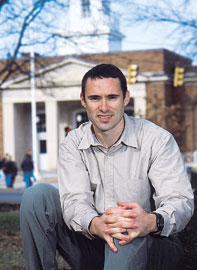

A publication of The Graduate School, University of North Carolina at Chapel Hill
On-Line Version Spring 2003
Home | Back issues | About us | The Graduate School | UNC-Chapel Hill | Make a gift
Seeing or Believing
Johnson Fellow investigates the dynamics of America's trust in politics
How
often would you say you trust the government to do the right thing?
 |
| Photo by Will Owens |
|
Luke Keele, right, with fellowship benefactors Ross and Charlotte Johnson at a Graduate School gathering last fall. The Johnson Family Disseration Fellowship is one of eight awards that support students in their final year. |
Luke Keele is looking to find
how most Americans answer this question and why. A Ross and Charlotte
Johnson Family Dissertation Fellowship has made it possible for him to
concentrate solely on this research in his final year as a doctoral student
in UNC's Department of Political Science.
"My fellowship has allowed me to not only finish my dissertation, but also really focus on producing high quality research," Keele said.
Recognizing the importance of graduate education and the final dissertation year in particular, Ross and Charlotte Johnson endowed the fellowship — part of the Society of Fellows — through a gift of stock. The award will support one exceptional Carolina graduate student each year as he or she focuses on completing the dissertation.
Chapel Hill residents and longtime friends of the University, the couple has enjoyed a long relationship with Carolina although neither can claim the University as alma mater.
Ross Johnson was part of the scientific team that founded the pharmaceutical company Glaxo's research entry into the United States, and in 1987, became involved with the UNC Department of Chemistry through his role as the company's vice president of chemistry. He also serves on the University's Graduate Education Advancement Board and has served as adjunct professor of chemistry and pharmacy.
The Johnsons also have contributed to the Richard G. Hiskey and the Ernest Eliel Graduate Fellowships, supporting students in chemistry.
Keele's dissertation, titled "In Whom Do We Trust? Confidence in American Political Institutions," is a quantitative study of 30 years of quarterly polling data measuring public trust in the federal government, namely the president and Congress, and the factors that drive trust up or down from performance to individual political predispositions.
According to Keele, political scientists began measuring trust in government around the late 1960s and early '70s, as they noticed a large decline following the steady highs of the post-World War II years.
To better understand the nature of public trust, Keele analyzed how the differing influences of recent performance indicators and individual cynicism about the political process predict changes in public trust in the government. Keele gathered his data from a collection of surveys, including the Gallup poll and the New York Times poll, that ask similar questions.
To judge recent performance, Keele used approval ratings for the president and Congress, public perception of economic performance by way of the Consumer Confidence Index, and the effect of scandals. Keele has found that according to these predictors, trust in government fluctuates frequently, but the legitimacy of the governmental process is unthreatened. If trust declines, the public will simply elect a new government.
In his analysis of the effects of cynicism on public trust, Keele's predictors included level of cynicism toward politics, civic activity and negative orientation toward the government. Because these views are more steadfast, Keele said, their effect is more visible in the long term and trust levels change less frequently. In this case, government legitimacy may be threatened, due to public hostility and disenchantment with the political process.
Keele has found, however, that trust can go up regardless of whether it is based on day-to-day performance or political cynicism.
 |
| Photo by Will Owens |
"Trust is something that's part of everyday politics," he said. "So long as the government can change its performance, it can gain trust."
Keele said the data also suggest that individuals have more trust in the government when their political party is in power. Scandals also affect trust, but not as significantly as the status of the economy or public perception of how well Congress is performing. Finally, trust is often subject to a "rally around the flag effect," which has been particularly evident since Sept. 11, 2001.
A Colorado native, Keele attended Calvin College in Michigan for his undergraduate degree. Following his graduation this spring, Keele looks forward to a teaching career.
- Alexandra Obregon
© 2003, The Graduate School, The University of
North Carolina at Chapel Hill
All text and images are property of The Graduate School
at the University of North Carolina-Chapel Hill. Contact Sandra Hoeflich
at shoeflic@email.unc.edu
to request permission for reproduction.